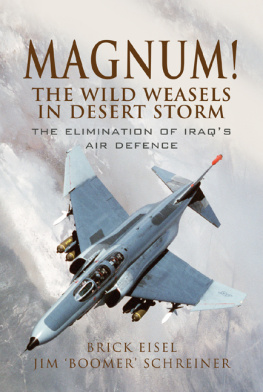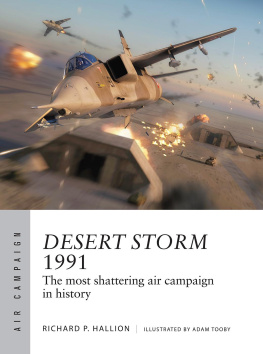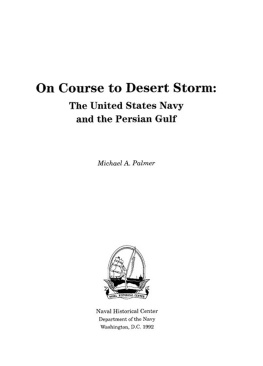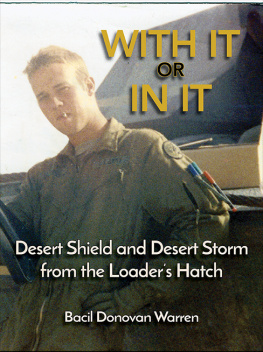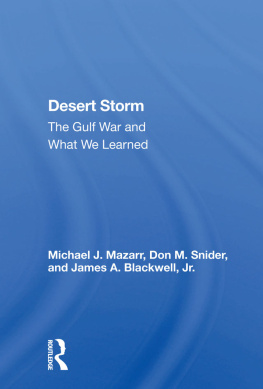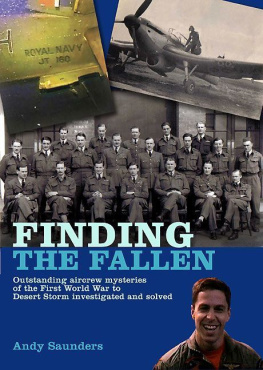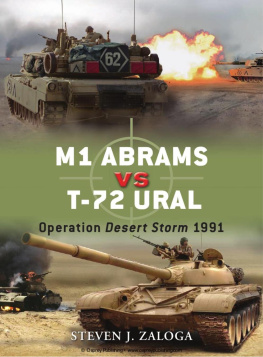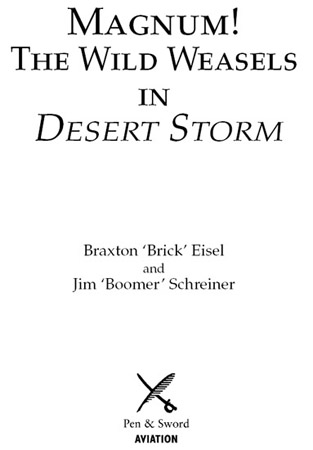
First published in Great Britain in 2009 by
Pen & Sword Aviation
an imprint of
Pen & Sword Books Ltd
47 Church Street
Barnsley
South Yorkshire
S70 2AS
Copyright Braxton Eisel and Jim Schreiner, 2009
ISBN: 9781844159079
Digital Edition ISBN: 9781848846999
The right of Braxton Eisel and Jim Schreiner to be identified as Authors
of this work has been asserted by them in accordance with the
Copyright, Designs and Patents Act 1988.
A CIP catalogue record for this book is
available from the British Library.
All rights reserved. No part of this book may be reproduced or transmitted in any
form or by any means, electronic or mechanical including photocopying, recording
or by any information storage and retrieval system, without
permission from the Publisher in writing.
Typeset in Palatino by
Phoenix Typesetting, Auldgirth, Dumfriesshire
Printed and bound in England by
CPI UK
Pen & Sword Books Ltd incorporates the imprints of Pen & Sword Aviation, Pen &
Sword Maritime, Pen & Sword Military, Wharncliffe Local History,
Pen & Sword Select, Pen & Sword Military Classics and Leo Cooper.
For a complete list of Pen & Sword titles please contact
PEN & SWORD BOOKS LIMITED 47
Church Street, Barnsley, South Yorkshire, S70 2AS, England
E-mail: enquiries@pen-and-sword.co.uk
Website: www.pen-and-sword.co.uk
Contents
Dedication
Eisel: For Dad, a SAC tanker toad for all those years, and Mom, a teacher for even more.
Schreiner: To those Americans who took the time to show how much they cared for all of the deployed servicemen and women by writing letters and sending care packages. Youll never know how much we all truly appreciated your thoughtful words and actions.
Acknowledgements
T his book is based upon a journal Jim Schreiner kept during his deployment to the Persian Gulf region for Operations Desert Shield and Desert Storm. Building upon that record and the recollections of other F-4G Wild Weasel aircrew, the authors hope to show a slice of what life and war was like during that time.
The United States Navy and Marine Corps, and Britain's Royal Air Force contributed heavily to suppressing and defeating the Iraqi air defences along with many other aircrews and other Coalition air forces. This book, however, deals with primarily with the United States Air Force's F-4G Wild Weasel mission. This in no way detracts from the efforts and success of the other services.
In that same vein, the recollections presented here are of those Wild Weasel pilots and EWOs interviewed and are not meant to be all-encompassing for the many other F-4G crewmembers who flew missions in Desert Storm. Some of those experiences will be similar, some will be quite different. Indeed, crews in the same flight on the same mission will recall events differently at times.
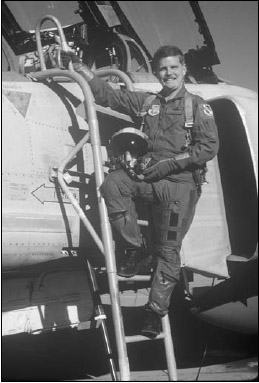
The authors would like to thank the Wild Weasels who contributed their time and memories to this project, as well as thanking them for serving their country.
Although facts are presented and official accounts and scholarly references used, the opinions expressed are strictly those of the authors. Likewise, any errors in the work are also solely due to the authors.
Introduction
W hen Iraqi President Saddam Hussein sent his military forces to invade and occupy the tiny neighbouring country of Kuwait in August 1990, his actions and the actions of the subsequent American-led coalition that stood against him made for a global chess game. The pieces on the board were controlled by those with the big picture.
The pawns in that game, the ones that had to actually do the fighting and dying, were the hundreds of thousands of men and women who left their homes and families to live for seemingly endless months in the vast, trackless desert while the world stage-play unfolded. To them, the war was deeply personal.
At times, the war was scary; at other times, it was funny as hell. Usually, if you survive the former, it turns into the latter.
Jim Schreiner:
7 J ANUARY 99 D + 56
Operation Desert Storm is now in full swing. At about 0245L (local Baghdad time), the first bombs impacted in Iraq. At 0400L the first of two AGM-88A HARMs erupted off of my aircraft on its way to some hapless SA-8 driver. Whether it actually hit or not, Ill probably never know.
Almost immediately after we crossed over into Kuwait, the entire sky opened up with enemy triple A and what looked like shoulder-launched SAMs. I have never seen such a beautiful yet so terrifying sight in my life. Nothing I have ever experienced or done prepared me for this.
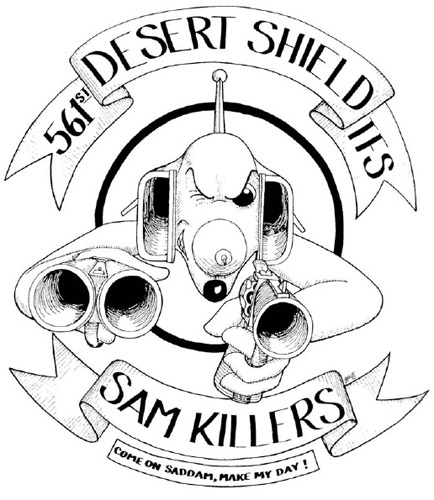
Hale cartoon showing a steely-eyed Wild Weasel character drawing a bead on Saddam using the two most used weapons; in the right hand is a shotgun, aka the AGM-45 Shrike missile, and in the left is a magnum, the AGM-88 HARM. (Kevin Hale)
Remembering all of the war movies that Ive seen, the thing that struck me the most about last night's cacophony was the lack of sound. The barrage of anti-aircraft fire seemingly all around my aircraft looked intimidating but was completely silent. Although it was probably a lot further away than I thought, it definitely got my attention!
Chapter One
T he first known US aircraft shot down by a surface-to-air missile (SAM) occurred on 1 May 1960. Francis Gary Powers, flying a more than 1,000 miles route overhead the Soviet Union in a CIA-sponsored Lockheed U-2 reconnaissance jet, saw several MiG fighters try to reach his altitude of well over 70,000 feet and fail. However, a Soviet V-750 Dvina, known to NATO as the SA-2 Guideline, the telephone pole-sized SAM that would become infamous half a decade later in the skies over North Vietnam, could almost reach him. He didnt know about it and couldnt see it. (Note: The NATO North Atlantic Treaty Organization nomenclature for Soviet-era SAMs, radars and aircraft is used throughout this work, e.g. Guideline.)
The SA-2 had a range of 25 miles and at Mach 4, could travel to its target in an incredibly short time. Not designed for low-altitude use, it was a deadly peril to anyone flying between 5,000 and 60,000 feet. Any aircraft wanting to avoid being a SAM target had to move into the low-level regime where old-fashioned guns became the biggest threat.
The SAM operator, under intense pressure coming directly from Soviet leader Nikita Kruschev, fired the instant Powers jet was within range. With a cloud of noxious fumes and a bright orange glow, the SA-2 salvo of three missiles quickly leapt from their launchers and rocketed skyward. The missile tracking Powers detonated close enough that although the explosive warhead did not hit him, the concussive shockwave, magnified in the thin air at such a height, tore the spindly U-2 apart.
From that day on, SAMs have become a major threat to Allied aircraft. Fielding better, more advanced SAMs and finding ways to defeat an adversarys SAMs has become a continuing theme for air forces around the world.
In the United States case, in its long tangle with North Vietnam, SA-2s were first photographed in April 1965. In July of that year, the first SAM killed a US fighter. From then on, increasingly more American resources were devoted to countering and defeating the deadly missiles.
Next page
